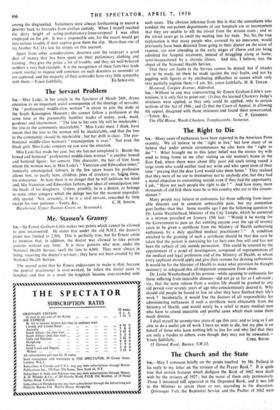Mr. Stassen's Granny
SIR,—Sir Ernest Graham-Little makes two points which cannot be allowed to pass unanswered. He states that under the old N.H.I. the doctor's panel was limited to 2,500. This is perfectly true, but Sir Ernest omits to mention that, in addition, the doctor was allowed to take private patients without any limit. It is these patients who now, under the National Health Service, swell the lists to 4,000. They were always in being, requiring the doctor's services ; they have not been created by the National Health Service.
The second point that Sir Ernest endeavours to make is that, because the general practitioner is over-worked, he refers the trivial cases to hospital, and that as a result the hotipitals become over-crowded with such cases. The obvious inference from this is that the consultants who conduct the out-patient departments of our hospitals are so incompetent that they are unable to sift the trivial from the serious cases ; and so the trivial'cases go to swell the waiting lists for beds. No, Sir, the true explanation is that many people who, covered by no insurance, would previously have been deterred from going to their doctor on the score of expense, are now attending in the early stages of illness and are being admitted for hospital treatment, instead of struggling along at home, semi-incapacitated by a chronic illness. And this, I believe, was the object of the National Health Service.
That there are faults in the Service cannot be denied, but if attacks are to be made, let them be made against.the real faults, and not by juggling with figures or by attributing difficulties to causes which only very partially explain them.—I am, Sir, yours faithfully, H. B. TIPLER.
Montreal, Cargate Avenue, Aldershot.
SIR,—Without in any way controverting Sir Ernest Graham-Little's con- tentions, it is only fair to point out: (I) that the learned Chancery Judge's strictures were applied, as they only could be applied, only to certain sections of the Act of 1946 ; and (2) that the Court of Appeal, in allowing the appeal, disagreed with those strictures and found them unwarranted.
—yours, &c., C. P. GOODDEN. The Old House, North Cheriton, Templerombe, Somerset.






































 Previous page
Previous page